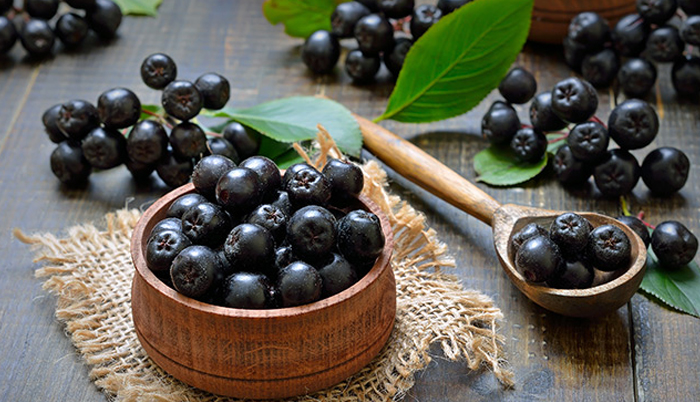![]() Home > Health
Home > Health
Prevent Aging-Related Changes And Oxidative Stress With Antioxidant Walnuts And Chokeberries

![]() May 21st, 2021 | 13:42 PM |
May 21st, 2021 | 13:42 PM | ![]() 273 views
273 views
NATURALNEWS
Juglans regia, commonly known as walnut, is one of the most widely used culinary nuts in modern kitchens. Although many people consider walnuts to be nuts, they are actually the seeds of stone fruits (drupes) produced by the J. regia tree. Walnuts originated in the Mediterranean region and in Central Asia, but because of their many uses, they are now cultivated around the world.
Walnuts are known for their abundance of two things: healthy fats and antioxidants. Walnuts are a rich source of two essential fatty acids, namely, the omega-6, linoleic acid, and the omega-3, alpha-linolenic acid (ALA). These healthy fats are known for their cardiovascular benefits. Linoleic acid is said to have cholesterol-lowering properties, while ALA is linked to a reduced risk of coronary artery disease.
Walnuts also contain one of the highest amounts of antioxidants among commonly consumed “tree nuts.” Studies show that walnuts provide more than 20 millimoles (mmol) of antioxidants per 100-gram (g) serving, or nearly thrice the amount found in pecans, the second most antioxidant-rich nut. Because of this, many researchers believe that the inclusion of walnuts in a well-balanced diet provides a certain amount of protection against chronic, oxidative stress-related degenerative diseases.
Like walnuts, Aronia melanocarpa, or black chokeberries, have one of the highest antioxidant content among fruits. These sour berries are produced by deciduous shrubs that originated in the eastern part of North America. Once used by Native Americans to treat colds, black chokeberries are now cultivated in Europe and Russia and used to make various commercial food products, such as jams, juices, fruit teas and wines.
Studies attribute the health benefits and medicinal uses of black chokeberries to their abundance of antioxidant polyphenols. Some of the polyphenols identified in chokeberries include phenolic acids, proanthocyanidins, anthocyanins, flavonols and flavanones. These antioxidants are not only capable of scavenging free radicals, but they can also suppress the formation of reactive oxygen species (ROS), restore the activities of antioxidant enzymes and regulate the levels of antioxidants inside the body.
In a recent study, South Korean researchers evaluated the combined antioxidant effects of walnuts and black chokeberries to determine if they could slow down or prevent aging. Numerous studies have linked ROS production and cellular damage caused by free radicals to accelerated or premature aging. To examine the anti-aging potential of these antioxidant-rich superfoods, the researchers tested them in a mouse model of d-galactose-induced aging. The results of this study were published in the journal Nutrition Research.
Walnuts and black chokeberries show anti-aging activities
According to a study published in Experimental and Therapeutic Medicine, d-galactose is a reducing sugar that contributes to ROS generation and reacts with certain amino acids to form advanced glycation end products (AGEs). AGEs are harmful molecules that promote oxidative stress, which is associated with inflammation and cell death. Along with the oxidation of lipids — the primary targets of free radicals — these events are said to accelerate the aging process. (Related: Could a simple vitamin be an anti-aging tool?)
Because of the huge role free radicals play in aging, dietary antioxidants, which can neutralize free radicals in a number of ways, have been the primary focus of many anti-aging studies. For their experiment, the Korean researchers chose two of the best sources of antioxidants and incorporated them into the diet of mice with d-galactose-accelerated aging. They divided 35 eight-week-old mice into the following groups:
Normal control, C
D-galactose control, D
D-galactose with chokeberry diet, CH
D-galactose with walnut diet, W
D-galactose with walnut and chokeberry diet, WCH
The researchers reported that all the treatment groups (CH, W and WCH) had significantly lower blood, liver and kidney malonaldehyde levels than group D. In fact, the levels of these parameters were almost the same as those of the control. As a biomarker of oxidative damage caused by free radicals to lipids, low malonaldehyde levels suggest that the consumption of walnuts and chokeberries reduced the amount of free radicals present in the bodies of aging mice.
The researchers also found that the liver malondialdehyde levels of the WCH group were significantly lower than those of group C. In addition, the superoxide dismutase and glutathione peroxidase levels of the WCH group were significantly higher than those of the W or CH groups, suggesting that walnuts and black chokeberries can increase antioxidant levels. Superoxide dismutase and glutathione peroxidase are antioxidant enzymes that catalyze the breakdown of harmful superoxide and peroxide radicals.
Based on these findings, the researchers concluded that walnuts and black chokeberries can prevent lipid peroxidation in the blood, liver and kidneys associated with d-galactose-induced aging.
Source:
courtesy of NATURALNEWS
by Evangelyn Rodriguez
If you have any stories or news that you would like to share with the global online community, please feel free to share it with us by contacting us directly at [email protected]